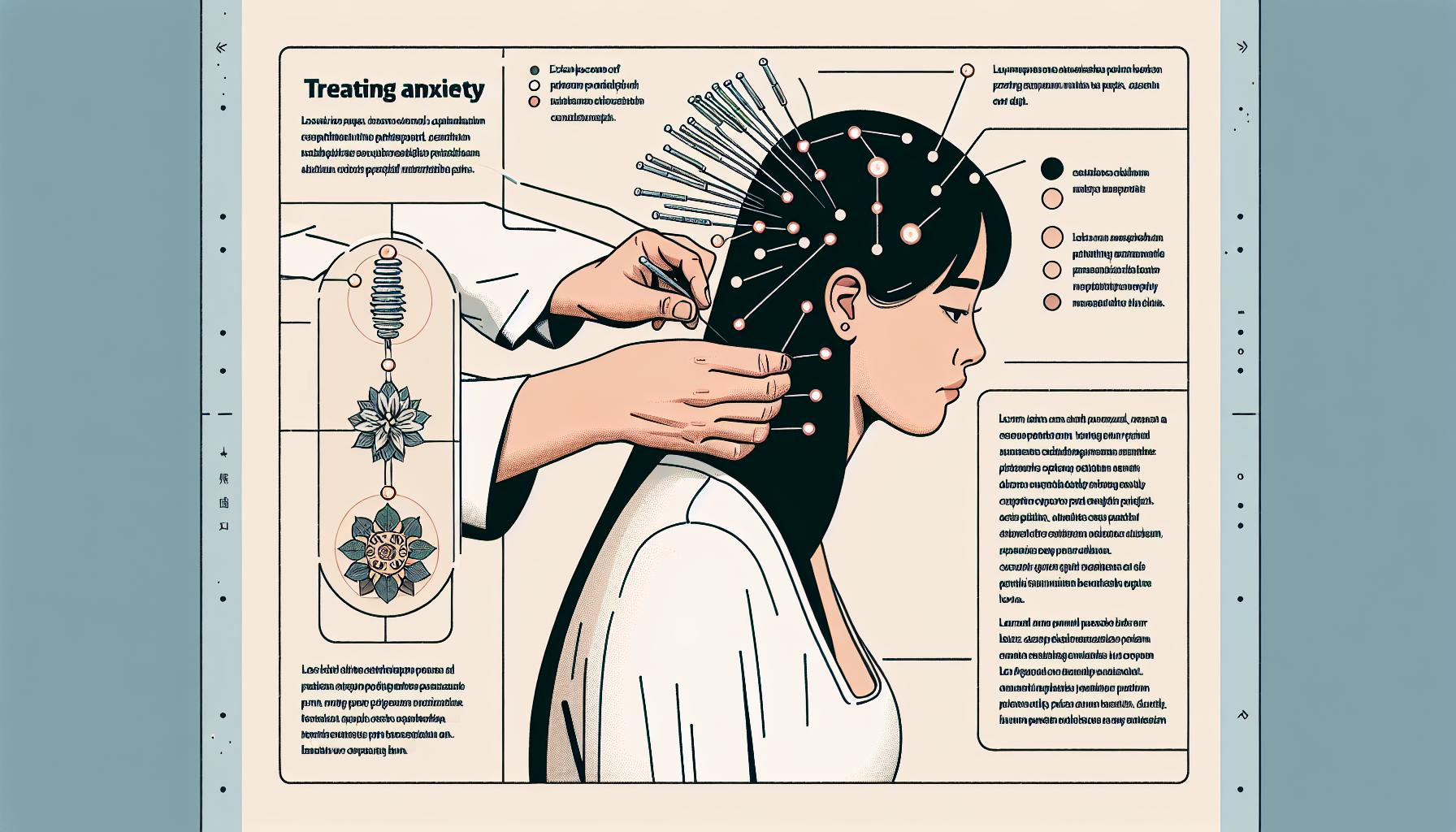If you’re grappling with anxiety, you’ve probably tried numerous remedies. But have you considered acupuncture? It’s an ancient Chinese therapy that’s been used for centuries to treat a variety of ailments, including anxiety.
The frequency of acupuncture sessions can vary widely and depends on your individual needs. Some people might need weekly sessions, while others might benefit from less frequent treatments. It’s all about finding what works best for your body and your anxiety levels.
Remember, there’s no one-size-fits-all answer when it comes to acupuncture for anxiety. Your acupuncturist will help you determine the best treatment plan for you. So, let’s delve into the specifics of how often you should get acupuncture for anxiety.
Key Takeaways
- Acupuncture, an ancient Chinese therapy, can help alleviate anxiety by balancing your Qi, making your body less hospitable to anxiety.
- The frequency of acupuncture sessions varies greatly from individual to individual. Factors such as the severity of your anxiety, your tolerance towards acupuncture, and the feedback your body gives as you undergo treatment sessions influence the frequency of your sessions.
- Keeping open communication with your acupuncturist is key and will support them in creating a personalized treatment plan for you. This plan will aim for long-term wellness rather than delivering quick relief from anxiety.
- Tracking your physical and emotional responses before and after every acupuncture session is crucial, not only for providing feedback to your acupuncturist but also for understanding your own progress.
- Developing a personalized acupuncture treatment plan is crucial for dealing with anxiety. Incorporating the acupuncture schedule into your routine without causing additional stress is equally important.
- Acupuncture is not a one-size-fits-all approach but a patient-centric one. It is a long-term commitment and a journey towards overall wellness where your unique circumstances and individual responses play a decisive role in shaping the frequency of sessions.
Exploring Acupuncture as a Treatment for Anxiety

Acupuncture is more than just the age-old practice of inserting thin needles into specific points on your body. It’s an extensive form of treatment that has been helping individuals manage their mental health for generations. Balancing your Qi (pronounced “chi”)—the vital energy flow within your body—is the heart of this treatment.
Acupuncture can help alleviate anxiety by balancing your Qi. When your Qi is out-of-whack, anxiety can creep in and make itself comfortable. Regular acupuncture sessions can keep your Qi balanced and anxiety at bay. Put simply, it’s all about making your body a less hospitable place for anxiety to reside.
Seeing an acupuncturist for anxiety is similar to going for a spa treatment. The only difference is the tools used and the benefits you reap. There’s a sense of tranquil calm when you hear the soft ambient music, experience the puncturing of the needles, and feel the release of tension as your Qi is manipulated.
When considering how often to get acupuncture for anxiety, it’s crucial to remember that everyone has a unique Qi balance and no “recommended” frequency suits everybody. Your treatment plan should be personalized to fit your needs. A well-trained acupuncturist will assess your Qi balance and recommend a schedule accordingly. This could range from multiple visits in a week to just a few sessions in a month.
Keeping communication open with your acupuncturist about how you’re feeling before, during, and after treatments is key. This can help them adjust your treatment schedule to best support your mental health.
With consistent sessions, you’ll likely start to notice less anxiety and better overall wellness. Remember, acupuncture for anxiety isn’t a quick fix. Regular visits over a period of time are typically necessary to see the manifestation of balance and healing. It’s a commitment to long-term wellness that starts from within and radiates outward.
Factors Influencing the Frequency of Acupuncture Sessions
Determining how often you should get acupuncture for anxiety isn’t as cut-and-dried as it might seem. Several factors can influence the frequency of your sessions. Every person is unique, and so is their relationship with anxiety.
One primary factor is the severity of your anxiety. Someone with debilitating anxiety may require more frequent acupuncture sessions compared to someone with milder symptoms. Your acupuncturist will assess your anxiety level in the initial consultation and recommend a personalized treatment plan.
Another crucial aspect to consider is your tolerance for acupuncture. It’s a relaxing process for many, similar to a spa treatment. However, others may find it less comfortable or may have a fear of needles. Your acupuncturist will communicate with you to establish the best course of action. If you’re uncomfortable, you won’t likely benefit from too frequent sessions.
Lastly, the feedback your body gives as you undergo treatment sessions is influential. The aim of acupuncture isn’t only to treat anxiety symptoms temporarily but also to rebalance your Qi. It’s a long-term commitment. You and your acupuncturist should continuously monitor changes in your body, energy levels, and mental state. This feedback will help refine the frequency of your treatment sessions.
In most cases, individuals start with frequent treatments – perhaps even more than once a week. As your symptoms improve and your Qi balances, you may taper off treatment frequency. Remember, it’s not about getting quick relief, but about the long-term wellness and balance that comes with regular, consistent acupuncture sessions.
Thus, open communication with your acupuncturist and listening to your body are key. Acupuncture isn’t a one-size-fits-all approach. It’s about finding the right balance and regimen that works best for your unique circumstances. Let’s now explore some common acupuncture treatment plans for anxiety.
Understanding Your Individual Needs and Preferences
When seeking acupuncture for anxiety, it’s not a one-size-fits-all approach. Treatment plans need to consider your unique needs and preferences. This encompasses the severity of your symptoms, your tolerance to acupuncture treatments, the response of your body to the sessions, and your personal schedule.
A crucial first step is to have a thorough and honest conversation with your acupuncturist. They’re not just a practitioner, but your partner in wellness. Share intricate details about your anxiety symptoms. What triggers your anxiety? How does it affect your day-to-day life? What facets of the treatment are you comfortable with and what aspects are causing anxiety? With this insight, your acupuncturist can customize a plan that’s considerate of your individual circumstances.
Personalization of the treatment plan is not a one-time affair. It requires ongoing communication and reassessment. You’ll need to pay attention to your body’s response during and after each acupuncture session. Note any changes in your mood, energy levels, sleep patterns, and anxiety symptoms.
Here’s a simple way to track your physical and emotional responses:
| Metric | Pre-Acupuncture | Post-Acupuncture |
|---|---|---|
| Mood | ||
| Energy Levels | ||
| Sleep Patterns | ||
| Anxiety Symptoms |
If you spot any negative responses or anomalies, promptly bring them up with your practitioner. They can adjust the subsequent treatments based on your feedback and body’s response.
Incorporate the acupuncture schedule into your personal timetable. Match the frequency of sessions with your comfort and availability. Strive for balance to reap the benefits without disrupting your regular routine. True, healing through acupuncture is a journey. Yet, it shouldn’t become a source of additional stress in your life.
Remember, getting acupuncture for anxiety isn’t just about the number of sessions. It largely hinges on an understanding of your unique needs and active participation in your treatment plans. Your individual response to acupuncture plays a decisive role in shaping the frequency of sessions. This patient-centric approach lets you garner maximum benefits from this holistic treatment modality.
Developing a Personalized Acupuncture Treatment Plan

Understanding your unique needs and preferences must be the core of your acupuncture treatment plan when seeking relief from anxiety. It’s important to remember that a one-size-fits-all approach isn’t effective when it comes to your mental wellness. Hence, your plan must be personalized and designed considering the important aspects of your life, including the severity of your symptoms, tolerance to acupuncture, and your personal schedule.
When starting, you’ll need to have an open conversation with your acupuncturist. Clear communication will allow your practitioner to accurately understand your situation and design a unique routine tailor-fit to your needs. As the treatment progresses, continued communication will help to assess the therapy’s effectiveness and whether or not any changes are required.
In this regard, keeping a track of your physical and emotional responses after each session is a good idea. This will help you monitor your improvements over time and provide insight into potential modifications in the therapy. It might be beneficial to maintain a diary where you can jot down your experiences, thoughts, and feelings after every session. Evaluating your thoughts and feeling post-treatment is crucial to adjust treatments accordingly, ensuring you receive the most benefit out of your sessions.
It’s also pivotal to incorporate the acupuncture schedule into your routine without causing additional stress. Remember, the goal of acupuncture therapy is to relieve anxiety and improve your mental well-being. If the treatment schedule itself becomes a source of stress, it defeats the purpose. Therapists usually suggest starting with more frequent sessions, which may gradually reduce as your condition improves.
Yet – there’s no universally correct answer to how many sessions you should undergo. The answer depends on your unique situation, the strength of your symptoms, and overall responsiveness. Without considering these factors, determining the frequency of sessions would be akin to shooting in the dark.
Conclusion
Your acupuncture treatment should be as unique as you are. It’s essential to work closely with your acupuncturist to develop a plan that fits your needs and life. Remember, the frequency of sessions isn’t a one-size-fits-all answer. It’s about what works best for your anxiety symptoms and your schedule. Keep track of how you’re feeling after each session – this will help fine-tune your treatment. Above all, the goal is to weave acupuncture into your routine seamlessly, without adding extra stress. So, don’t worry about sticking to a rigid schedule. Instead, focus on creating a flexible, personalized plan that brings you the most relief.
1. Why is personalized acupuncture treatment important for anxiety relief?
A personalized acupuncture treatment plan is crucial for anxiety relief because it caters to individual needs such as symptom severity, your tolerance to acupuncture, and your personal schedule. This ensures that the treatment is maximally effective without causing additional stress.
2. What role does communication play in developing an acupuncture plan for anxiety?
Open communication with the acupuncturist allows tailoring the plan to your specific needs and circumstances. It helps in understanding things like your symptom intensity, acupuncture tolerance, and personal schedule which can influence treatment efficacy.
3. Why should I track my physical and emotional responses?
Tracking your physical and emotional responses after each session can provide valuable feedback for assessing progress and making necessary adjustments for better results.
4. Should I incorporate my acupuncture schedule into my routine?
Incorporating your acupuncture schedule into your routine is recommended because it ensures regular sessions without causing additional stress.
5. How should the frequency of acupuncture sessions be determined?
The frequency of acupuncture sessions shouldn’t follow a universal guideline. Instead, it should be determined based on individual circumstances, the severity of symptoms, and responsiveness to the treatment.
The post Deciding the Right Frequency of Acupuncture for Effective Anxiety Relief appeared first on After Anxiety.
Deciding the Right Frequency of Acupuncture for Effective Anxiety Relief published first on https://after-anxiety.com/

